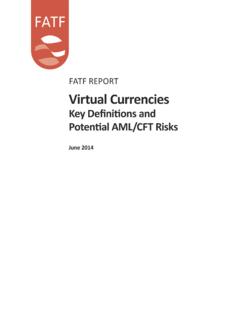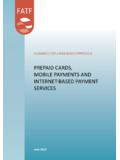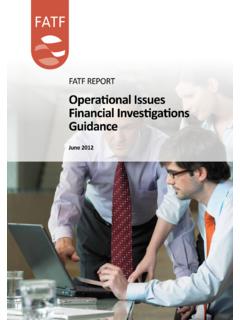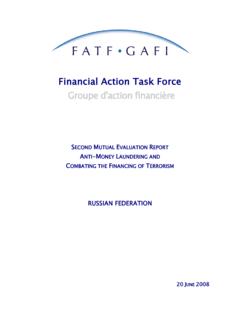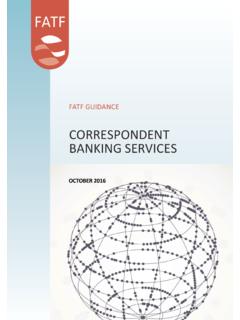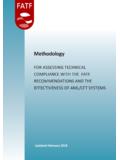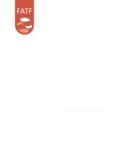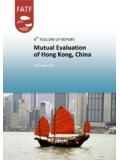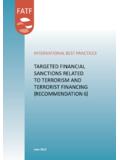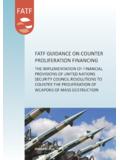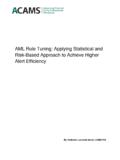Transcription of Best Practices on Trade Based Money Laundering
1 Financial Action Task Force Groupe d action financi re Best Practices paper Best Practices on Trade Based Money Laundering 20 June 2008 Please note that this document refers to the FATF Recommendations as last updated and published in October 2004, and does not yet take into account the 2012 revision of the FATF Recommendations. See for the 2012 FATF Recommendations, including the conversion table from the old Recommendation to the new FATF Recommendation. FATF Guidance Document FATF/OECD 2008 All rights reserved. No reproduction, copy, transmission or translation of this publication may be made without written permission.
2 Applications for permission to reproduce all or part of this publication should be made to: FATF Secretariat, OECD, 2 rue Andr Pascal 75775 Paris Cedex 16, France BEST Practices paper ON Trade Based Money Laundering Money Laundering and terrorist financing through the Trade system Introduction 1. The Financial Action Task Force (FATF) has recognised misuse of the Trade system as one of the main methods by which criminal organisations and terrorist financiers move Money for the purpose of disguising its origins and integrating it into the formal economy.
3 As the anti- Money Laundering (AML) and counter-terrorist financing (CFT) standards that have been applied to other Money Laundering techniques have become increasingly effective, such abuse of the Trade system is expected to become increasingly attractive. However, currently, many customs agencies, law enforcement agencies, financial intelligence units (FIU), tax authorities and banking supervisors ( competent authorities) appear less capable of identifying and combating Trade - Based Money Laundering than they are in dealing with other forms of Money Laundering and terrorist financing.
4 2. The objective of this best Practices paper is to improve the ability of competent authorities to collect and effectively utilise Trade data, both domestically and internationally, for the purpose of detecting in a risk- Based manner and investigating Money Laundering (ML) and terrorist financing (TF) through the Trade system. The FATF will continue to explore vulnerabilities in the Trade system, including those related to Trade finance, with a view to identifying other measures that could be considered in combating illicit use of the Trade system.
5 Statement of the problem 3. The FATF typologies studies indicate that criminal organisations and terrorist groups are exploiting vulnerabilities in the international Trade system to move value for illegal purposes. A number of specific Money Laundering cases were identified which involved the proceeds from various types of predicate offences to include, but not limited to, illicit trafficking in narcotic drugs, illicit trafficking in stolen or other goods, corruption and bribery, fraud, counterfeiting/piracy of products and smuggling.
6 The most basic schemes involve fraudulent Trade Practices such as: over- and under-invoicing of goods and services, multiple invoicing of goods and services, over- and under-shipments of goods and services, and falsely describing goods and services. More complicated schemes integrate these fraudulent Practices into a complex web of transactions and movements of Inherent vulnerabilities in the international Trade system, including the enormous volume of Trade flows, which obscures individual transactions, provide abundant opportunity for criminal organisations and terrorist groups to transfer value across borders.
7 Definitions 4. For the purposes of this best Practices paper , the following definitions apply. 5. The term Trade - Based Money Laundering and terrorist financing (TBML/FT) refers to the process of disguising the proceeds of crime and moving value through the use of Trade transactions in an attempt to legitimise their illegal origins or finance their activities. Examples of how TBML/FT may be carried out 1 Some examples may include moving value through the financial system ( using cheques or wire transfers), the use of front companies, the physical movement of banknotes ( using cash couriers), and concealing bulk cash in cargo.
8 1 include, but are not limited to: misrepresentation of the price, quantity or quality of imports or exports; and Money Laundering through fictitious Trade activities and/or through front companies. 6. The term Trade data refers to whatever information a jurisdiction collects, by paper or electronically, on its import-export forms or supporting For example, such information usually includes a description of the goods being imported or exported, their quantity, value, weight, customs or tariff code number, the mode of transportation by which the goods are being imported or exported, and/or the name and address of the exporter (consignor)
9 , importer (consignee), and shipping company. In some cases, financial or banking data is also collected. 7. The term Trade authorities refers to the authorities who are responsible for collecting, analysing and/or storing Trade data. 8. The term investigative authorities refers to the competent authorities who are responsible for investigating Money Laundering , terrorist financing and/or the underlying predicate offence ( customs fraud, smuggling, narcotics trafficking).
10 3 9. The term Trade finance refers to the financial component of an international Trade transaction ( managing the payment for goods and related services being imported or exported). Trade finance activities may involve, among other things, managing payments for open account trading, or issuing letters of credit, standby letters of credit and guarantees. 10. The term trader refers to anyone who facilitates the exchange of goods and related services across national borders, international boundaries or territories.
